Warcross Read online
ALSO BY MARIE LU
The Young Elites
The Rose Society
The Midnight Star
Legend
Prodigy
Champion
G. P. PUTNAM’S SONS
an imprint of Penguin Random House LLC
375 Hudson Street
New York, NY 10014
Copyright © 2017 by Xiwei Lu.
Penguin supports copyright. Copyright fuels creativity, encourages diverse voices, promotes free speech, and creates a vibrant culture. Thank you for buying an authorized edition of this book and for complying with copyright laws by not reproducing, scanning, or distributing any part of it in any form without permission. You are supporting writers and allowing Penguin to continue to publish books for every reader.
G. P. Putnam’s Sons is a registered trademark of Penguin Random House LLC.
Library of Congress Cataloging-in-Publication Data is available upon request.
Ebook ISBN 9780399547980
This is a work of fiction. Names, characters, places, and incidents either are the product of the author’s imagination or are used fictitiously, and any resemblance to actual persons, living or dead, businesses, companies, events, or locales is entirely coincidental.
Version_1
For Kristin and Jen
Thank you for changing my life and for being here all these years later
Contents
Also by Marie Lu
Title Page
Copyright
Dedication
Epigraph
Chapter 1
Chapter 2
Chapter 3
Chapter 4
Chapter 5
Chapter 6
Chapter 7
Chapter 8
Chapter 9
Chapter 10
Chapter 11
Chapter 12
Chapter 13
Chapter 14
Chapter 15
Chapter 16
Chapter 17
Chapter 18
Chapter 19
Chapter 20
Chapter 21
Chapter 22
Chapter 23
Chapter 24
Chapter 25
Chapter 26
Chapter 27
Chapter 28
Chapter 29
Chapter 30
Chapter 31
Acknowledgments
There’s not a person in the world who hasn’t heard of Hideo Tanaka, the young mastermind who invented Warcross when he was only thirteen. A global survey released today shows that a staggering 90 percent of people ages 12–30 now play on a regular basis, or at least once a week. This year’s official Warcross Championships are expected to draw more than 200 million viewers. [ . . . ]
Correction:
An earlier version of this story mistakenly described Hideo Tanaka as a millionaire. He is a billionaire.
—THE NEW YORK DIGEST
MANHATTAN
New York, New York
1
It’s too damn cold of a day to be out on a hunt.
I shiver, tug my scarf up higher over my mouth, and wipe a few snowflakes from my lashes. Then I slam my boot down on my electric skateboard. The board is old and used, like everything else I own, its blue paint almost entirely scraped off to reveal cheap silver plastic underneath—but it’s not dead yet, and when I push my heel down harder, it finally responds, jerking me forward as I squeeze between two rows of cars. My bright, rainbow-dyed hair whips across my face.
“Hey!” a driver yells as I maneuver past his car. I glance over my shoulder to see him waving a fist at me through his open window. “You almost clipped me!”
I just turn around and ignore him. Usually, I’m a nicer person than this—or, at least, I would have shouted an apology. But this morning, I’d woken up to a yellow paper taped to the door of my apartment, its words printed in the largest font you can imagine.
72 HOURS TO PAY OR VACATE
Translation: I’m almost three months behind on my rent. So, unless I can get my hands on $3,450, I’ll be homeless and in the streets by the end of the week.
That’d put a damper on anyone’s day.
My cheeks sting from the wind. The sky beyond the cut of skyscrapers is gray, turning grayer, and in a few hours this flurry of snow will become a steady fall. Cars jam the streets, a nonstop trail of brake lights and honking from here all the way to Times Square. The occasional scream of a traffic controller’s whistle sounds above the chaos. The air is thick with the smell of exhaust, and steam billows from an open vent nearby. People swarm up and down the sidewalks. Students coming home from school are easy to spot, their backpacks and fat headphones dotting the crowds.
Technically, I should be one of them. This should have been my first year of college. But I started skipping classes after Dad died, and I dropped out entirely several years ago. (Okay, fine—technically, I was expelled. But I swear I would’ve quit anyway. More on that later.)
I look down at my phone again, my mind returning to the hunt. Two days ago, I had gotten the following text message:
New York Police Department ALERT!
Arrest warrant out for Martin Hamer.
Payment $5,000.
The police are so busy these days with the increasing crime in the streets that they don’t have time to hunt for petty criminals on their own—petty criminals like Martin Hamer, who’s wanted for gambling on Warcross, stealing money, and allegedly selling drugs to fund his bets. So, about once a week, the cops send out a message like this, a promise to pay anyone who can catch the criminal in question.
That’s where I come in. I’m a bounty hunter, one of many in Manhattan, and I’m fighting to capture Martin Hamer before another hunter can.
Anyone who’s ever fallen on hard times will understand the nearly constant stream of numbers that run through my mind. A month’s rent in the worst apartment in New York: $1,150. A month’s food: $180. Electricity and internet: $150. Boxes of macaroni, ramen, and Spam left in my pantry: 4. And so on. On top of that, I owe $3,450 in unpaid rent, and $6,000 in credit card debt.
The number of dollars left in my bank account: $13.
Not the normal things a girl my age worries about. I should be freaking out over exams. Turning in papers. Waking up on time.
But I haven’t exactly had a normal adolescence.
Five thousand dollars is easily the largest bounty in months. For me, it might as well be all the money in the world. So, for the last two days, I’ve done nothing but track this guy. I’ve lost four bounties in a row this month. If I lose this one, too, I’m going to be in real trouble.
Tourists always clogging up the streets, I think as a detour forces me down a path right into Times Square, where I get stuck behind a cluster of auto-taxis jammed at a pedestrian walkway. I lean back on my board, pull myself to a halt, and start inching backward. As I go, I glance down at my phone again.
A couple of months ago, I’d succeeded in hacking into the main directory of Warcross players in New York and synced it all up to my phone’s maps. It’s not hard, not if you remember that everyone in the world is connected in some way to everyone else. It’s just time-consuming. You worm your way into one account, then branch out to their friends, then their friends, and eventually, you’re able to track the location of any player in New York City. Now I’ve finally managed to place my target’s physical location, but my phone’s a cracked, beat-up old thing, with an antique battery that’s on its last legs. It keeps trying to sleep in order to save energy, and the screen is so dark I can barely see anything.
“Wake up,” I mutter, squinting at the pixels.
Finally, the poor phone lets out a pitiful buzz, and the red location marker updates on my map.
I make
my way out of the taxi jam and push my heel down on my board. It protests for a moment, but then it speeds me forward, a dot in a sea of moving humanity.
Once I reach Times Square, screens tower above me, surrounding me in a world of neon and sound. Every spring, the official Warcross Championships kick off with a huge ceremony, and two teams of top-ranking players compete in an all-stars opening round of Warcross. This year’s opening ceremony happens tonight in Tokyo—so all the screens are Warcross-related today, showing a frenzied rotation of famous players, commercials, and footage of last year’s highlights. Frankie Dena’s latest, craziest music video plays on the side of one building. She’s dressed like her Warcross avatar—in a limited edition suit and webbed glitter cape—and dancing with a bunch of businessmen in bright pink suits. Underneath the screen, a group of excited tourists stop to pose for photos with some guy dressed in fake Warcross gear.
Another screen features five of the superstar players competing in tonight’s opening ceremony. Asher Wing. Kento Park. Jena MacNeil. Max Martin. Penn Wachowski. I crane my neck to admire them. Each one is dressed from head to toe in the hottest fashion of the season. They smile down at me, their mouths big enough to swallow the city, and as I look on, they all hold up cans of soda, declaring Coca-Cola their drink of choice during game season. A marquee of text scrolls below them:
TOP WARCROSS PLAYERS ARRIVE IN TOKYO, POISED FOR WORLD DOMINATION
Then I’m through the intersection and cut onto a smaller road. My target’s little red dot on my phone shifts again. It looks like he’s turned onto Thirty-Eighth Street.
I squeeze my way through another few blocks of traffic before I finally arrive, pulling over along the curb beside a newsstand. The red location dot now hovers over the building in front of me, right above a café’s door. I tug my scarf down and let out a sigh of relief. My breath fogs in the icy air. “Caught you,” I whisper, allowing myself a smile as I think of the five-thousand-dollar bounty. I hop off my electric skateboard, pull out its straps, and swing it over my shoulder so that it bumps against my backpack. It’s still warm from use, the heat of it seeping through my hoodie, and I arch my back to savor it.
As I pass the newsstand, I glimpse the magazine covers. I have a habit of checking them out, searching for coverage of my favorite person. There’s always something. Sure enough, one of the magazines features him prominently: a tall young man lounging in an office, dressed in dark trousers and a crisp collar shirt, sleeves casually rolled up to his elbows, his face obscured by shadows. Below him is the logo for Henka Games, Warcross’s parent studio. I stop to read the headline.
HIDEO TANAKA TURNS 21
INSIDE THE PRIVATE LIFE OF THE WARCROSS CREATOR
My heart skips a familiar beat at my idol’s name. Too bad there’s no time to stop and flip through the magazine. Maybe later. I reluctantly turn away, adjust my backpack and board higher on my shoulders, and pull up my hood to cover my head. The glass windows I pass reflect a distorted vision of myself—face elongated, dark jeans stretched too long, black gloves, beat-up boots, faded red scarf wrapped around my black hoodie. My rainbow-colored hair spills out from underneath my hood. I try to imagine this reflected girl printed on the cover of a magazine.
Don’t be stupid. I push the ridiculous thought away as I head toward the café’s entrance, shifting my thoughts instead to the running checklist of tools in my backpack.
Handcuffs
Cable launcher
Steel-tipped gloves
Phone
Change of clothes
Stun gun
Book
On one of my first hunts, my target threw up all over me after I used my stun gun (#6) on him. I started bringing a change of clothes (#5) after that. Two targets have managed to bite me, so after a few tetanus shots, I added the gloves (#3). The cable launcher (#2) is for getting to hard-to-reach places and catching hard-to-reach people. My phone (#4) is my portable hacking assistant. Handcuffs (#1) are because, well, obviously.
And the book (#7) is for whenever the hunt involves a lot of waiting around. Entertainment that won’t eat up my batteries is always worth bringing.
Now I step into the café, soak in the warmth, and check my phone again. Customers are lined up along a counter displaying pastries, waiting for one of the four auto-cashiers to open. Decorative bookshelves line the walls. A smattering of students and tourists sit at the tables. When I point my phone’s camera at them, I can see their names hovering over their heads, meaning none of them have set themselves on Private. Maybe my target isn’t on this floor.
I wander past the shelves, my attention shifting from table to table. Most people never really observe their surroundings; ask anyone what the person sitting nearby was wearing, and chances are good that they can’t tell you. But I can. I can recite to you the outfits and demeanor of every person in that coffee line, can tell you exactly how many people are sitting at each table, the precise way someone’s shoulders hunch just a little too much, the two people sitting side by side who never say a word, the guy who is careful not to make eye contact with anyone else. I can take in a scene like a photographer might take in a landscape—relax my eyes, analyze the full view all at once, search for the point of interest, and take a mental snapshot to remember the whole thing.
I look for the break in the pattern, the nail that protrudes.
My gaze pauses on a cluster of four boys reading on the couches. I watch them for a while, waiting for signs of conversation or the hint of notes being passed by hand or phone. Nothing. My attention goes to the stairs leading to the second floor. No doubt other hunters are closing in on this target, too—I have to get to him before anyone else does. My steps quicken as I head up.
No one is here, or so it seems. But then I notice the faint sound of two voices at a table in a far corner, tucked behind a pair of bookshelves that make them almost impossible to see from the stairs. I move in closer on silent feet, then peek through the shelves.
A woman is seated at the table, her nose buried in a book. A man stands over her, nervously shuffling his feet. I hold up my phone. Sure enough, both of them are set to Private.
I slip to the side of the wall so that they can’t see me, and listen closely.
“I don’t have until tomorrow night,” the man is saying.
“Sorry,” the woman replies. “But there’s not much I can do. My boss won’t release that kind of money to you without taking extra security measures, not when the police have an arrest warrant for you.”
“You promised me.”
“And I’m sorry, sir.” The woman’s voice is calm and cynical, like she’s had to say this countless times before. “It’s game season. The authorities are on high alert.”
“I have three hundred thousand notes with you. Do you have any idea what that’s exchanging for?”
“Yes. It’s my job to know,” the woman answers in the driest voice I’ve ever heard.
Three hundred thousand notes. That’s about two hundred thousand dollars, at the current exchange rate. High roller, this one. Gambling on Warcross is illegal in the United States; it’s one of the many laws the government has recently passed in a desperate attempt to keep up with technology and cybercrime. If you win a bet on a Warcross match, you win game credits called notes. But here’s the thing—you can either take those notes online or to a physical place, where you meet a teller like this lady. You trade your notes to her. She gives you real cash in return, while taking a cut for her boss.
“It’s my money,” the guy is insisting now.
“We have to protect ourselves. Extra security measures take time. You can come back tomorrow night, and we can exchange half of your notes.”
“I told you, I don’t have until tomorrow night. I need to leave the city.”
The conversation repeats itself all over again. I hold my breath as I listen. The woman has all but confirmed his identity.
My eyes narrow, and my lips turn up into a hungry little smirk. This, ri
ght here, is the moment I live for during a hunt—when the bits and pieces I’ve exposed converge into a fine point, when I see my target standing physically before me, ripe for the picking. When I’ve solved the puzzle.
Got you.
As their conversation turns more urgent, I tap my phone twice and send out a text message to the police.
Suspect in physical custody.
I get a reply almost immediately.
NYPD ALERTED.
I pull the stun gun out of my backpack. It catches for an instant against the edge of the zipper, making the faintest scraping sound.
The conversation halts. Through the bookshelves, both the man and woman jerk their heads toward me like deer in headlights. The man sees my expression. His face is covered in a sheen of sweat, and his hair is plastered against his forehead. A fraction of a second passes.
I shoot.
He bolts—I miss him by a hair. Good reflexes. The woman darts up from her table, too, but I could care less about her. I race after him. He hops down the stairs three at a time, nearly falling in his rush, scattering his phone and a bunch of pens behind him. He sprints for the entrance as I reach the first floor. I burst through the revolving glass door right behind him.
We emerge onto the street. People let out startled shouts as the man shoves them aside—he knocks a camera-clicking tourist flat on her back. In one movement, I swing my electric board to the ground, jump on, and slam my heel down as hard as I can. It makes a high-pitched whoosh—I lunge forward, speeding down the sidewalk. The man glances over his shoulder to see me gaining fast on him. He darts left down the street at a full, panicked run.
I veer in his direction at such a sharp angle that the edge of my board protests against the pavement, leaving a long, black line. I aim my stun gun at the man’s back and shoot.
He shrieks and falls. Instantly, he tries to stand again, but I catch up to him. He grabs my ankle. I stumble, kicking at him. His eyes are wild, his teeth clenched and jaw tight. Out flashes a blade. I see its glint in the light just in time. I kick him off me and roll away right before he can stab at my leg. My hands get a grip on his jacket. I fire the stun gun once more, this time at close range. It hits true. His body goes rigid, and he collapses on the pavement, trembling.

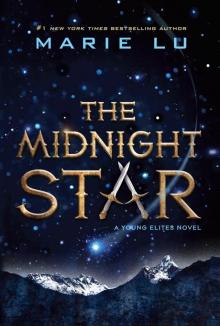 The Midnight Star
The Midnight Star Legend
Legend Prodigy
Prodigy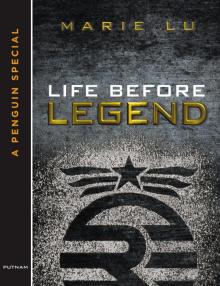 Life Before Legend
Life Before Legend Legend Trilogy Boxed Set
Legend Trilogy Boxed Set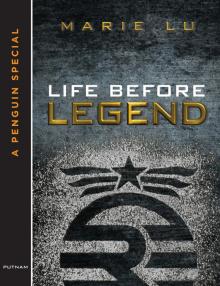 Life Before Legend: Stories of the Criminal and the Prodigy
Life Before Legend: Stories of the Criminal and the Prodigy Wildcard
Wildcard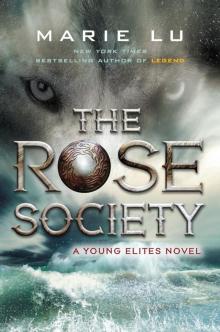 The Rose Society
The Rose Society Warcross
Warcross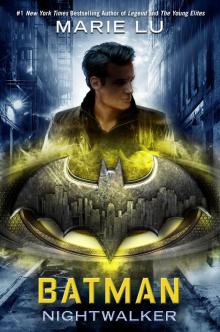 Batman: Nightwalker
Batman: Nightwalker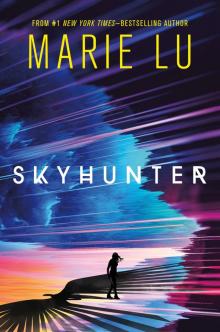 Skyhunter
Skyhunter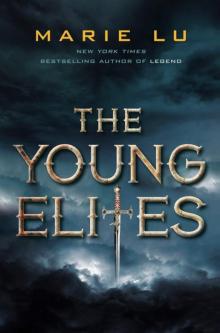 The Young Elites
The Young Elites The Kingdom of Back
The Kingdom of Back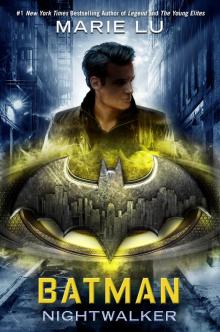 Batman
Batman Champion: A Legend Novel
Champion: A Legend Novel Wildcard (Warcross)
Wildcard (Warcross)